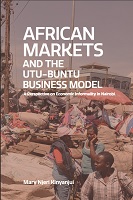African Markets and the Utu-buntu Business Model
A Perspective on Economic Informality in Nairobi
Author(s)
Njeri Kinyanjui, Mary
Collection
ScholarLedLanguage
EnglishAbstract
The persistence of indigenous African markets in the context of a hostile or neglectful business and policy environment makes them worthy of analysis. An investigation of Afrocentric business ethics is long overdue. Attempting to understand the actions and efforts of informal traders and artisans from their own points of view, and analysing how they organise and get by, allows for viable approaches to be identified to integrate them into global urban models and cultures. Using the utu-ubuntu model to understand the activities of traders and artisans in Nairobi’s markets, this book explores how, despite being consistently excluded and disadvantaged, they shape urban spaces in and around the city, and contribute to its development as a whole. With immense resilience, and without discarding their own socio-cultural or economic values, informal traders and artisans have created a territorial complex that can be described as the African metropolis. African Markets and the Utu-buntu Business Model sheds light on the ethics and values that underpin the work of traders and artisans in Nairobi, as well as their resilience and positive impact on urbanisation. This book makes an important contribution to the discourse on urban economics and planning in African cities.
Keywords
utu-buntu; markets; Africa; urban planning; citiesDOI
10.5281/zenodo.2628333ISBN
9781928331797; 9781928331803OCN
1099686057Publisher
African MindsPublisher website
https://www.africanminds.co.za/Publication date and place
Cape Town, 2019Classification
Development studies
Urban communities
Sociology: work and labour
Urban and municipal planning and policy


 Download
Download Web Shop
Web Shop